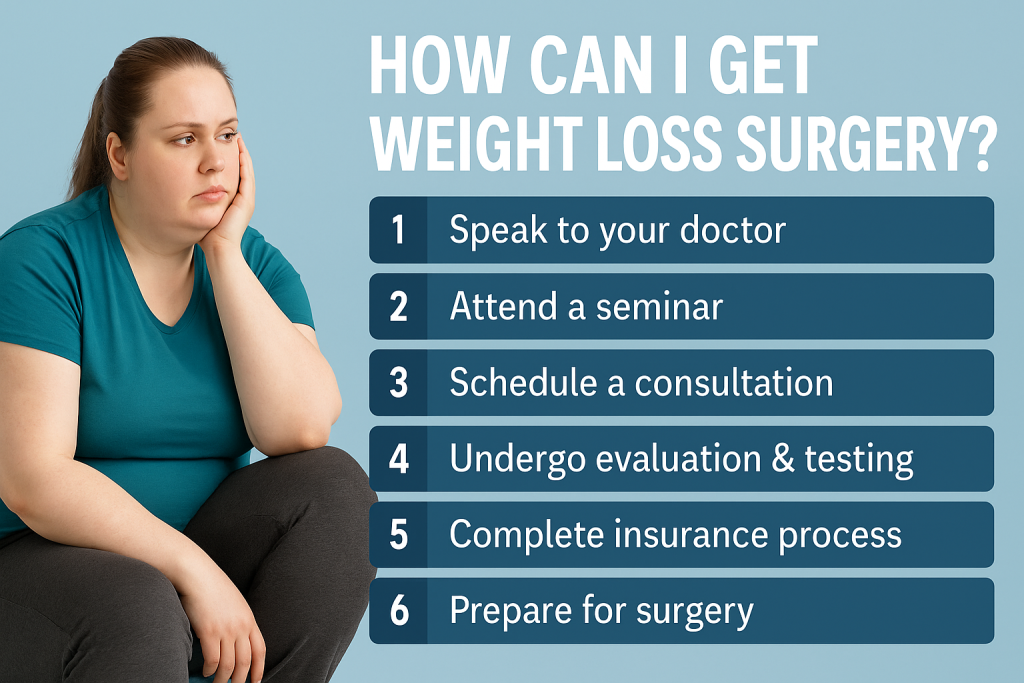Weight loss surgery, also known as bariatric surgery, can be a life-changing option for people struggling with obesity and related health problems. But the process of getting approved for and undergoing weight loss surgery involves several essential steps, including eligibility assessment, medical evaluations, insurance navigation, and lifestyle changes. If you’re wondering, “How can I get weight loss surgery?”, this comprehensive guide will walk you through each stage to help you make informed decisions for your health and future.
What Is Weight Loss Surgery?
Weight loss surgery encompasses various surgical procedures that help individuals lose weight by changing the digestive system’s anatomy or limiting food intake. The most common types include:
- Gastric Bypass (Roux-en-Y)
- Gastric Sleeve (Sleeve Gastrectomy)
- Adjustable Gastric Band
- Biliopancreatic Diversion with Duodenal Switch (BPD/DS)
These surgeries are typically recommended for individuals who have not achieved significant weight loss through conventional methods like diet and exercise.
Am I Eligible for Weight Loss Surgery?
Not everyone qualifies for bariatric surgery. Medical professionals evaluate several criteria to determine eligibility, including:
- Body Mass Index (BMI): Generally, a BMI of 40 or higher qualifies, or a BMI of 35–39.9 with obesity-related health conditions such as type 2 diabetes, hypertension, or sleep apnea.
- Previous Weight Loss Efforts: Documented attempts at weight loss through diet, exercise, or medically supervised programs.
- Age: Candidates are typically between 18 and 65 years old, although exceptions may be made.
- Mental Health: Psychological evaluation to assess readiness and rule out conditions that could interfere with recovery.
- Health Status: Must be healthy enough for surgery and anesthesia.
If you’re unsure about your eligibility, your journey should start with a primary care provider or a bariatric surgeon consultation.
Steps to Getting Weight Loss Surgery
1. Speak to Your Doctor or Primary Care Provider
Begin by discussing your weight loss goals and concerns with your doctor. They can evaluate your overall health, review your medical history, and refer you to a bariatric surgery program if appropriate.
2. Attend a Bariatric Surgery Seminar
Most bariatric centers require potential patients to attend a free seminar or informational session. These seminars offer valuable details about:
- Types of weight loss surgery
- Benefits and risks
- Lifestyle changes required
- What to expect before and after surgery
3. Schedule a Consultation with a Bariatric Surgeon
During your initial consultation, the bariatric surgeon will:
- Review your medical history
- Discuss surgical options
- Order necessary medical tests
- Explain the preoperative process
4. Undergo Preoperative Evaluation and Testing
Expect a series of medical evaluations, which may include:
- Blood work
- Electrocardiogram (EKG)
- Imaging studies (such as ultrasound or X-ray)
- Sleep studies (for sleep apnea)
- Psychological assessment
- Nutritional counseling
These tests help customize your surgical plan and ensure you are healthy enough for surgery.
5. Complete Insurance Authorization (If Applicable)
Insurance often covers weight loss surgery, but the process can be lengthy. Steps may include:
- Submitting documentation of prior weight loss attempts
- Completing a supervised weight loss program (3–6 months, in some cases)
- Gathering letters of medical necessity
- Getting psychological and nutritional clearance
Check with your insurance provider early to understand specific requirements and coverage.
6. Pre-Surgery Preparation
Once approved, you’ll likely be required to:
- Follow a special preoperative diet to shrink your liver
- Stop certain medications (as directed by your doctor)
- Quit smoking (if applicable)
- Arrange for post-surgery support and transportation
7. Weight Loss Surgery Day
On surgery day, you’ll be prepped and undergo your chosen procedure. Most weight loss surgeries are performed using minimally invasive laparoscopic techniques, which typically mean shorter recovery times.
8. Postoperative Recovery and Lifestyle Changes
Recovery times vary depending on the type of surgery but generally include:
- Hospital stay of 1–3 days
- Gradual transition from liquid to soft, then solid foods
- Regular follow-up with your bariatric team (nutritionist, psychologist, surgeon)
- Commitment to long-term lifestyle changes, including diet and exercise
Support groups and ongoing counseling are highly recommended to help you achieve your long-term weight loss goals.
How Much Does Weight Loss Surgery Cost?
The cost of bariatric surgery varies based on procedure type, location, and insurance coverage. In the United States, the average cost ranges from $15,000 to $25,000 without insurance. With coverage, out-of-pocket costs may be significantly lower.
Many insurance plans—including Medicare and Medicaid—now cover weight loss surgery, provided you meet specific medical criteria and complete the required preoperative steps.
How to Improve Your Chances of Approval
Insurance and surgical approval can be competitive and thorough. To boost your chances:
- Maintain detailed records of previous weight loss efforts
- Attend all required appointments and seminars
- Communicate with your bariatric team and insurance provider regularly
- Address any mental health concerns proactively
- Show commitment to lifestyle changes
Weight Loss Surgery Risks and Considerations
All surgeries carry risks. Bariatric surgery risks can include:
- Infection
- Blood clots
- Nutritional deficiencies
- Dumping syndrome (especially with gastric bypass)
- Complications related to anesthesia
Discuss all potential risks and benefits with your surgeon before proceeding.
Frequently Asked Questions
How long does the process take from initial consultation to surgery?
The timeline varies but typically ranges from 3 to 6 months, depending on insurance requirements, required weight loss programs, and preoperative tests.
Can I pay for surgery out-of-pocket?
Yes, if insurance does not cover the procedure or you do not meet their requirements, you can pay out-of-pocket. Many bariatric centers offer financing options.
Will I need to lose weight before surgery?
Many programs require a preoperative diet and some initial weight loss to reduce surgical risks and demonstrate commitment.
Is weight loss surgery reversible?
Some procedures, like gastric banding, are reversible, but most (such as sleeve gastrectomy and gastric bypass) are considered permanent.
Conclusion: Taking the First Step Toward Weight Loss Surgery
The journey to weight loss surgery can be challenging, but it offers hope and improved health to those struggling with obesity. If you’re asking, “How can I get weight loss surgery?”, follow the steps outlined: consult your doctor, attend seminars, complete required evaluations, and commit to the necessary lifestyle changes. Weight loss surgery is not a quick fix, but with careful planning and dedication, it can be a transformative tool on your path to better health.


